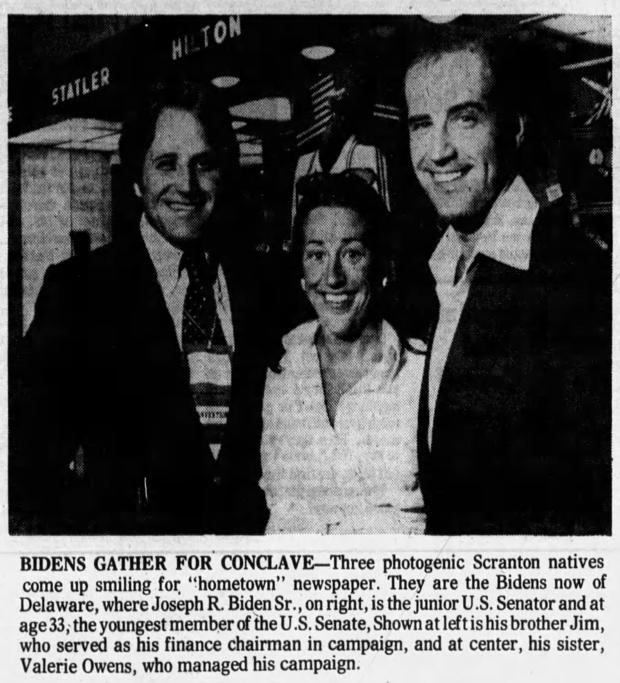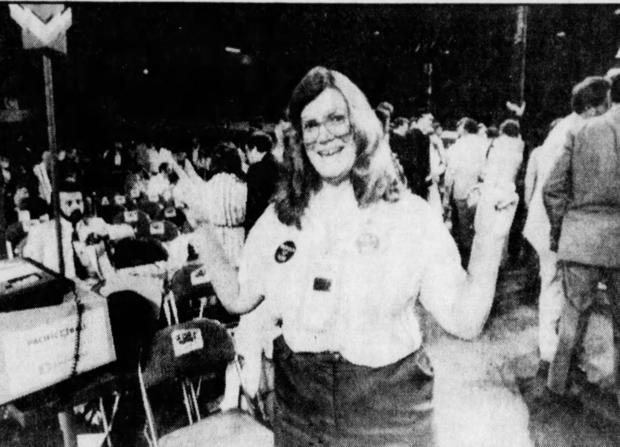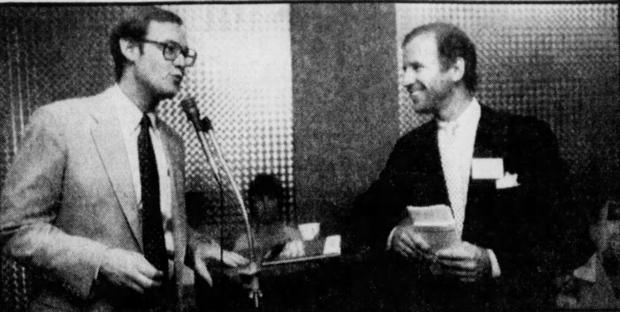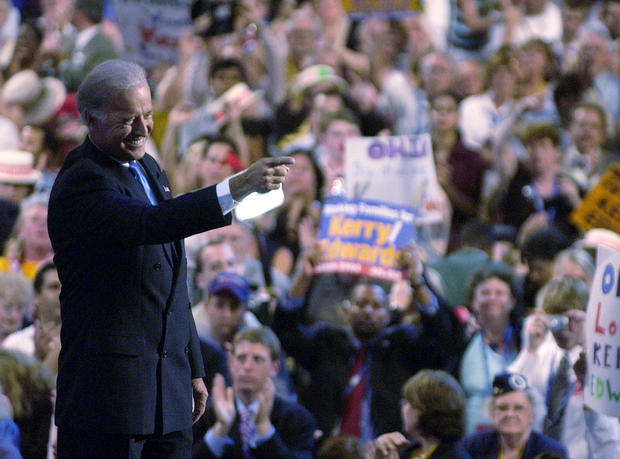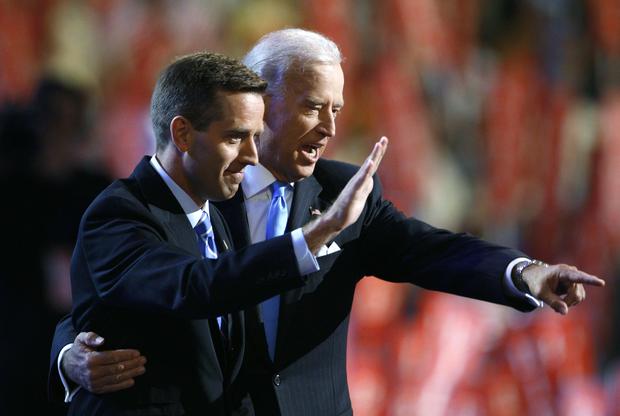Highlights from Joe Biden’s almost 50 years at Democratic conventions. He’s now center stage.
Wilmington – For the past 48 years, Joe Biden has traveled to all but one Democratic national convention, playing a supporting role for the party’s nominee. This year the convention is coming home to him – he’ll be in Wilmington, Delaware, Thursday evening to accept the nomination for president, surrounded only by those closest to him and a small, socially-distanced press corps, instead of thousands of rowdy delegates.
In years past, some of the party faithful liked going to the national nominating conventions for the week-long party atmosphere. Biden went to feast on party politics as he calculated his future.
In 1972, Biden, then a New Castle County Council member, skipped votes to attend the convention in Miami Beach in the middle of his long-shot Senate campaign, according to The Morning News, a Delaware paper. He won his Senate race.
Four years later, he was a Democratic darling and the first senator to endorse Jimmy Carter’s presidential bid.
The Morning Tribune
In 1980, Biden led a group of senators who opposed Ted Kennedy’s primary challenge against Carter at the convention, the Sacramento Bee reported at the time. Carter prevailed in the nomination fight when Kennedy withdrew, a move that drew the attention of TV analysts away from Biden’s first-ever convention address.
Biden’s non-primetime speech, denouncing the “false hope” and “hollow dreams” of Ronald Reagan, was only broadcast by one network, CBS. But according to The Morning News, the speech led the Delaware delegation to unfurl a banner hinting at what else may have been on the senator’s mind: “Biden in ’84.”
Biden didn’t run in 1984 – Walter Mondale and Geraldine Ferraro led the ticket – but he used the convention to lay the groundwork for the following campaign cycle. “[Biden] is playing the hotel circuit this week, dashing from crowded caucuses to private parties, urging Democrats to work for the ticket in 1984 and answering the inevitable questions about 1988,” the Morning News wrote. Each day during convention, the 41-year-old senator made a point of meeting with high-profile donors on the sidelines.
There was another sign at the 1984 convention that Biden might be getting ready for his own presidential run: reporters were allowed access to his teenage sons. Beau, then 14, dubbed his father “a great U.S. senator” in a story for The News Journal.
At least one delegate in 1984 thought that Biden had potential: Maine delegate Keron Kerr, a 38-year-old second grade teacher, cast the lone — and first ever — vote for Biden to be the Democratic nominee that year. “Joe was my first choice,” Kerr told The News Journal, “I really think he is a future presidential candidate.”
The News Journal
Now a 74-year-old Florida retiree, Kerr said in a phone interview that she was initially interested in Pete Buttigieg and Amy Klobuchar during the 2020 primary campaign but is now is “very happy” Biden is the nominee. “I didn’t think it would it take this long, however,” she joked.
Kerr told CBS News a few months after the ’84 convention she was invited to a Maine Senate fundraiser featuring Biden where he thanked her personally for her support. “He got down on one knee and took my hand and kissed it and said, ‘Thank you for voting for me!'”
The News Journal
Kerr got her wish when Biden launched his first presidential bid in 1987, though he soon soon dropped out over a plagiarism scandal. When the 1988 convention rolled into Atlanta with Massachusetts Governor Michael Dukakis as the presumptive nominee, Biden’s home state delegation still bore a grudge.
The video showing Biden quoting a British Labor Party leader without crediting him had been leaked by a Dukakis campaign aide. Dukakis had already apologized to Biden, but that did little to soothe Biden’s supporters. “Joe would have been up there giving this guy [Dukakis] a hell of a race,” one union man told The Morning News.
But Biden had to miss the 1988 convention anyway, because he was recovering from a second surgery that summer after a brain aneurysm had nearly killed him. Even in his absence, Biden received two votes for the nomination from a couple of fellow Delawareans.
He was back in form at the 1992 Democratic convention in New York City, pleading with uncommitted Iowa delegates to support Bill Clinton, “Please, as they say in my state, look the boy over,” Biden told the group, according to the Des Moines Register.
Clinton’s re-nomination convention in 1996 brought Biden’s first primetime address. The Democratic Party’s platform that year called for “law and order” and Biden had pushed through the 1994 crime bill, allowing him to highlight the assault weapons ban, the Violence Against Women Act and thousands of additional community police officers. But Biden also pitched an ongoing tough-on-crime approach, stressing that while 95% of youth crime was “non-violent,” the Democrat’s promise was this: “We’ll continue to get tough with kids who break the law. Gang members and other young people who commit violent crimes will do jail time. We’ll not allow young thugs to terrorize our neighborhoods.”
The 2000 nominating convention for Al Gore centered on “integrity,” Biden said addressing the Iowa delegation. The Delaware senator said he was “outraged by ‘Bill Clinton’s incredible indiscretion’ with former White House intern Monica Lewinsky,” the Cedar Rapids Gazette reported. Also during the convention, Biden shared with the Associated Press a telephone conversation he’d had with President Clinton shortly after the Lewinsky affair became public. Biden was quoted telling Mr. Clinton he was “lucky” he was not standing near him. “I’d knock you on your ass,” he said.
On Tuesday — now 20 years later — Clinton will be addressing the Democratic Convention as Biden is nominated.
CHARLIE NEIBERGALL / AP
In 2004, with “In the Midnight Hour” by Wilson Pickett as his walk-on music, Biden strode on stage and began his address by paraphrasing William Butler Yeats’ “Easter, 1916,” a selection that remained a favorite for Biden on the 2020 campaign trail: “The world has changed, has changed utterly. A terrible beauty has been born.”
The convention finally became his own when he was selected as Barack Obama’s running mate in 2008. Biden was introduced by Beau Biden, 24 years after his son had boasted about his father’s credentials.
“Even though Dad worked in Washington, he’s never been part of Washington,” Beau explained to the delegates gathered about Biden’s nightly trips home from Washington to Wilmington on Amtrak.
REUTERS/Chris Wattie
And in 2012 after his military deployment to Iraq, Beau was back on stage re-nominating his father for a second term as vice president. High in the crowd looking down at the stage, Biden turned around to wipe his tears.
In 2016, Biden at the beginning of his convention speech thanked those gathered for their support after Beau’s death from brain cancer just a year before. He summed up his feelings by quoting Ernest Hemingway: “The world breaks everyone and afterwards, many are strong at the broken places.”
On Thursday, Biden returns for his seventh convention speech, this time as the head of his party, as the ongoing pandemic, economic crisis and search for racial justice engulf the country.
Biden’s deputy campaign manager said his speech will embrace the “importance of leadership” and “that it is possible for us…to restore the soul of our nation, to restore civility and to work together to get things done.”

